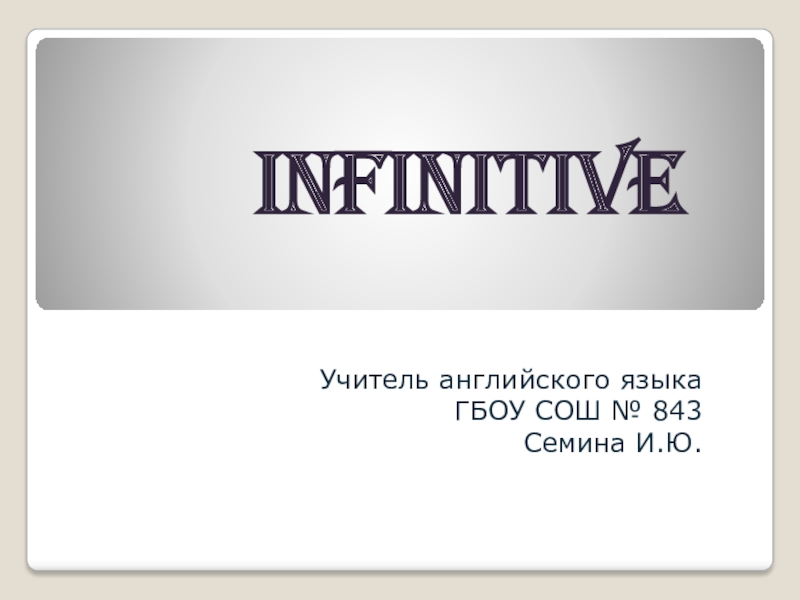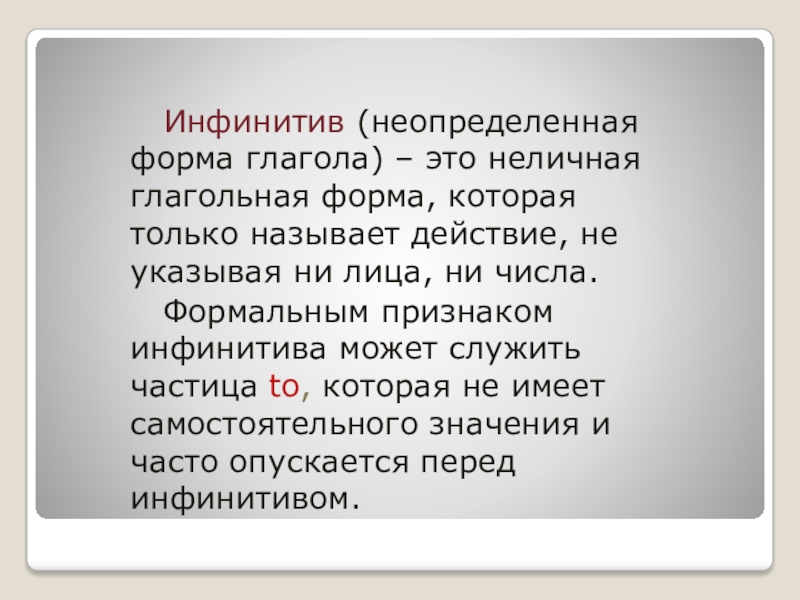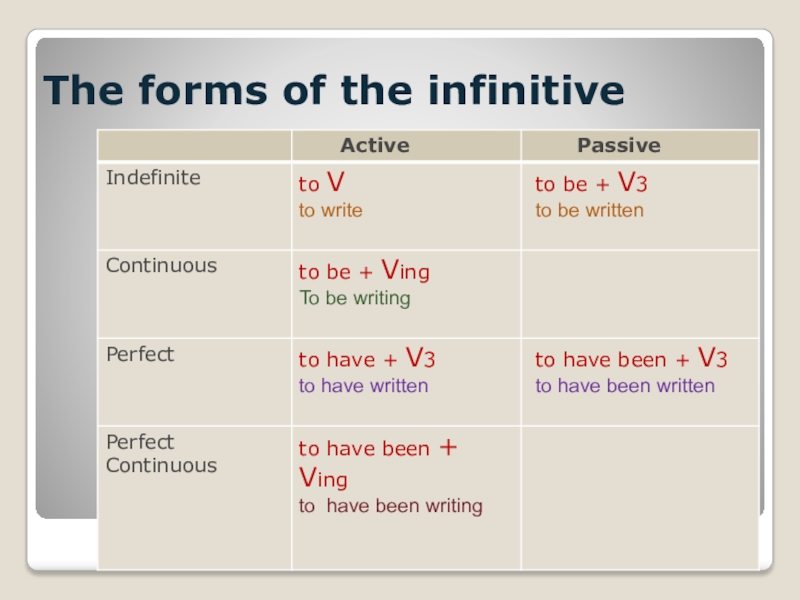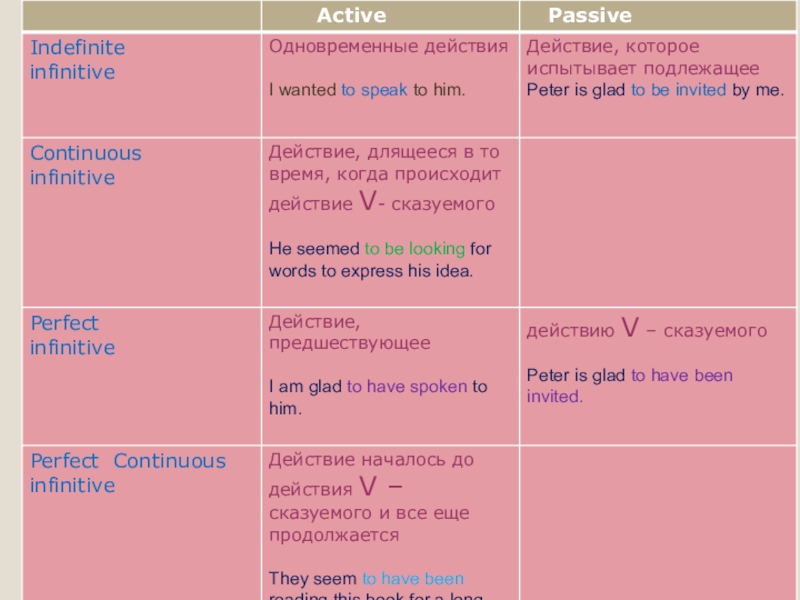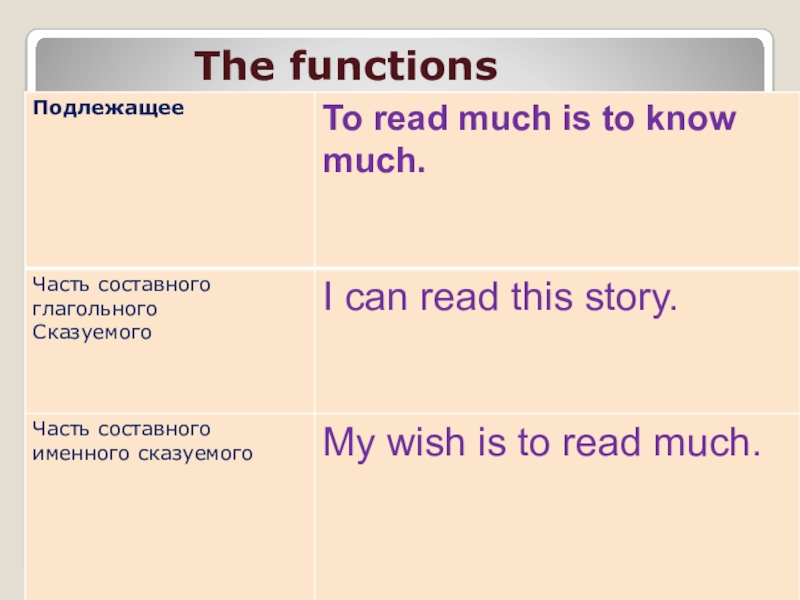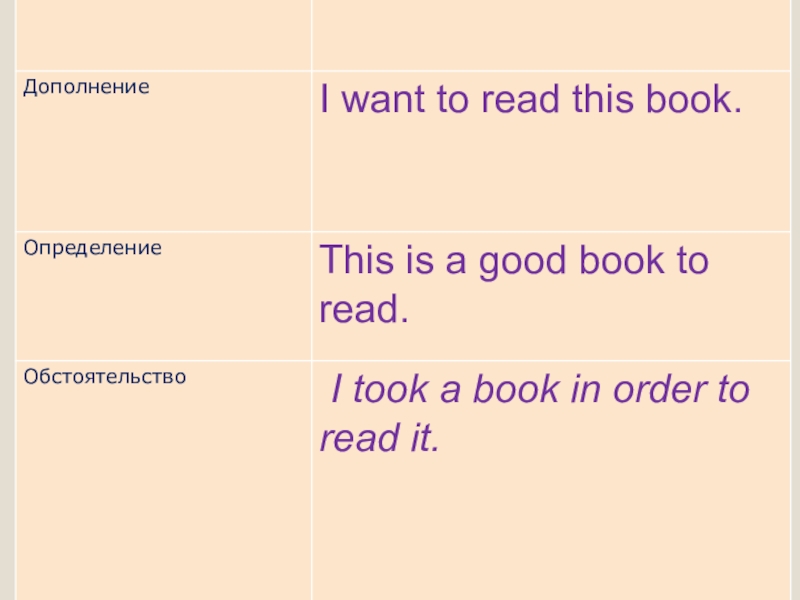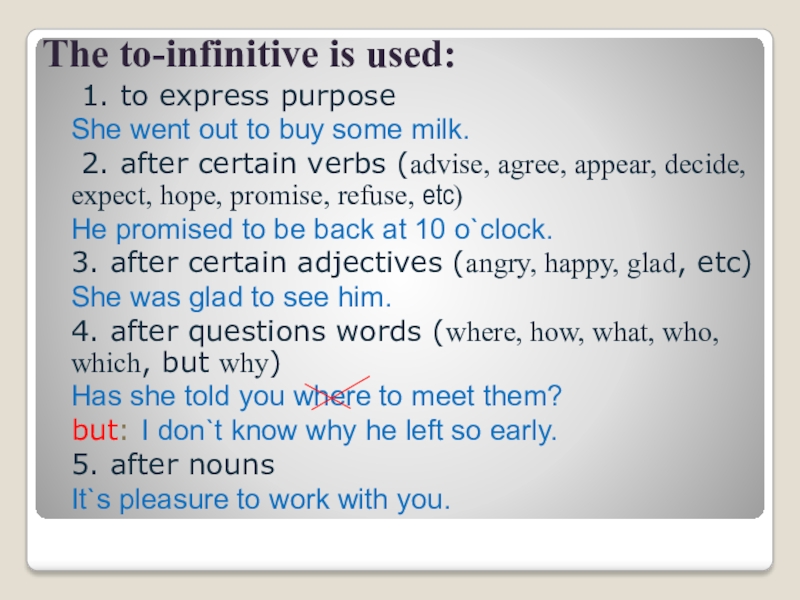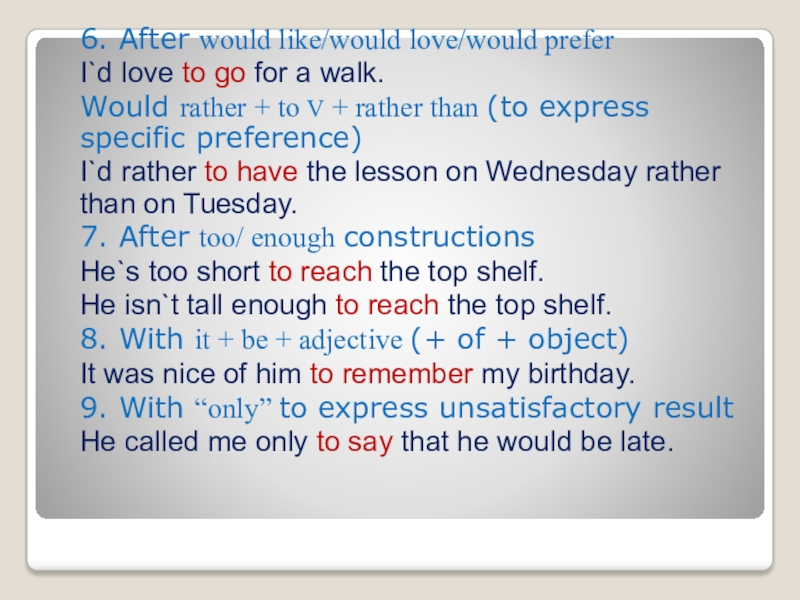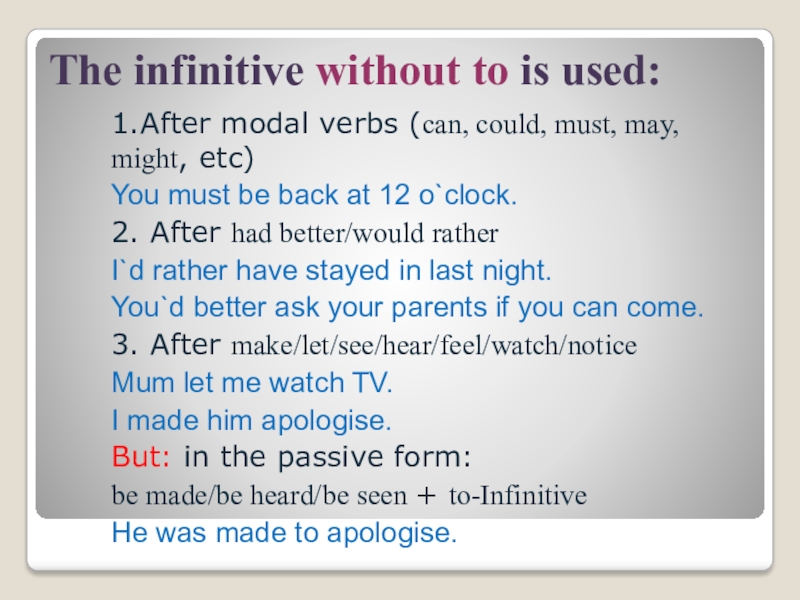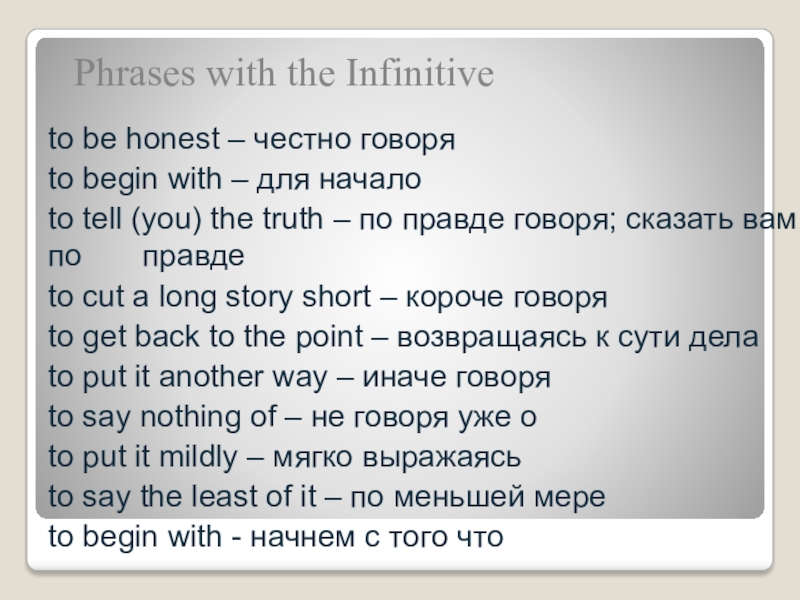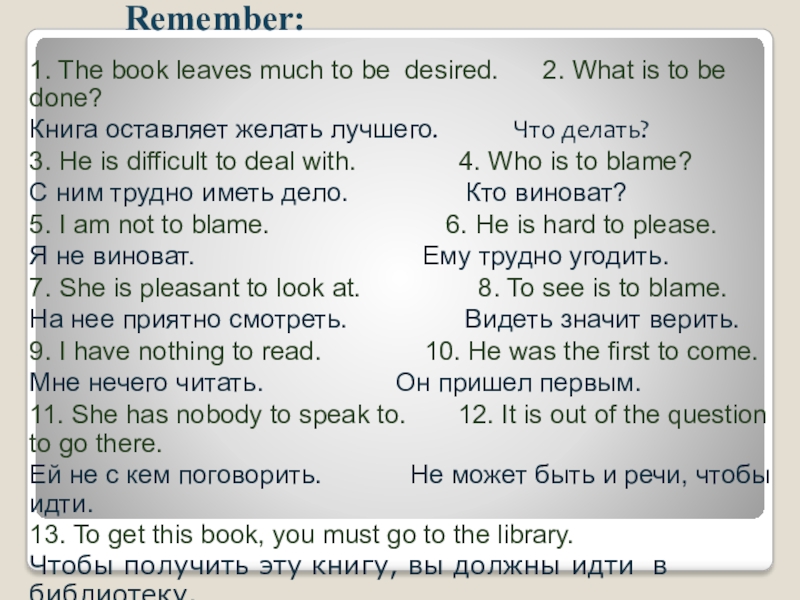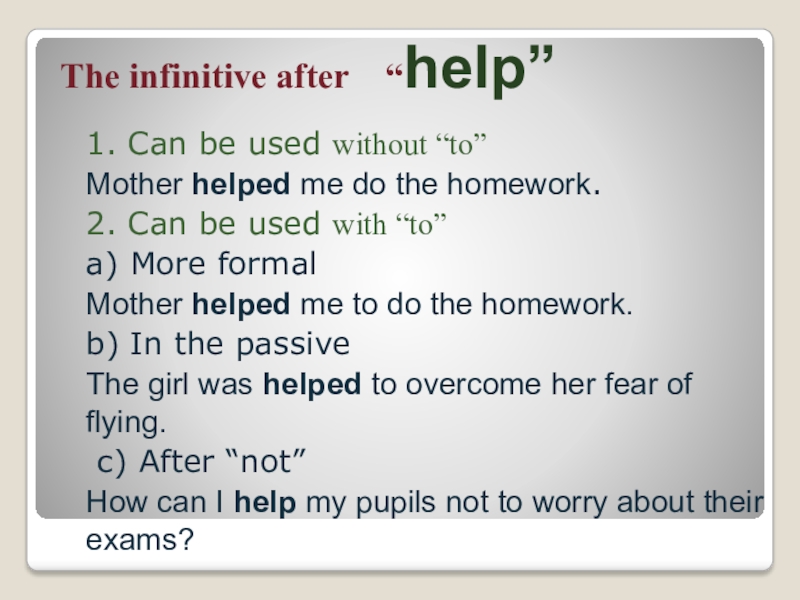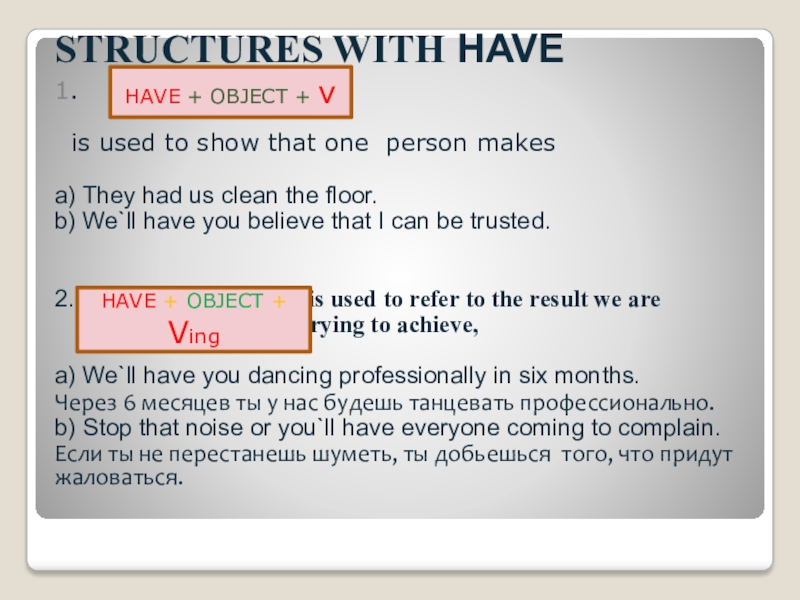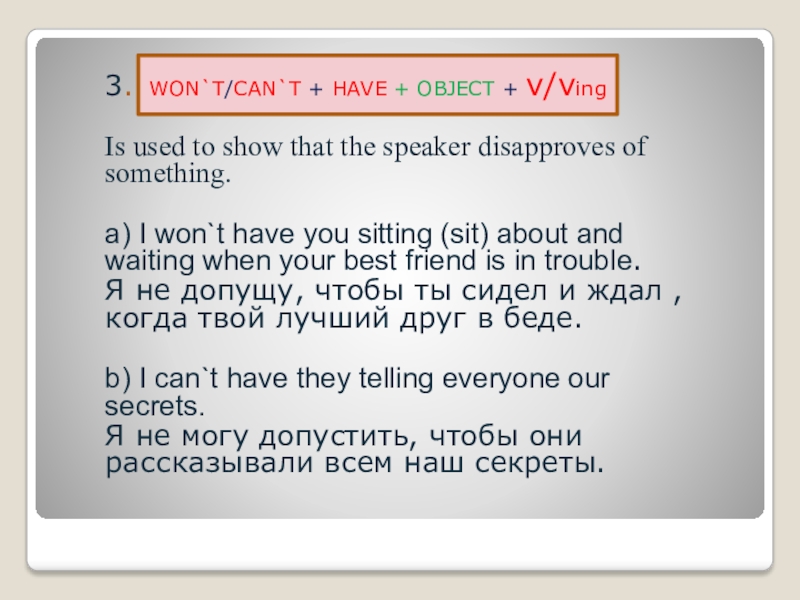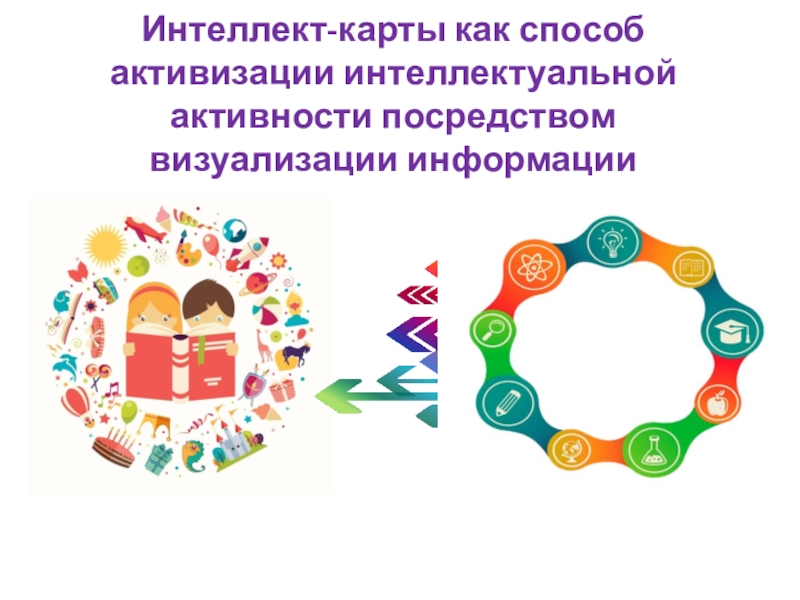- Главная
- Разное
- Образование
- Спорт
- Естествознание
- Природоведение
- Религиоведение
- Французский язык
- Черчение
- Английский язык
- Астрономия
- Алгебра
- Биология
- География
- Геометрия
- Детские презентации
- Информатика
- История
- Литература
- Математика
- Музыка
- МХК
- Немецкий язык
- ОБЖ
- Обществознание
- Окружающий мир
- Педагогика
- Русский язык
- Технология
- Физика
- Философия
- Химия
- Шаблоны, фоны, картинки для презентаций
- Экология
- Экономика
Презентация, доклад по английскому языку на тему Infinitive
Содержание
- 1. Презентация по английскому языку на тему Infinitive
- 2. Инфинитив (неопределенная форма глагола)
- 3. The forms of the infinitive
- 4. Слайд 4
- 5. The functions
- 6. The functions
- 7. The to-infinitive is used: 1. to express
- 8. 6. After would like/would love/would preferI`d love
- 9. The infinitive without to is used:1.After modal
- 10. Phrases with the Infinitiveto be honest –
- 11. Remember: 1. The book leaves much
- 12. The infinitive after “help”1. Can be
- 13. STRUCTURES WITH HAVE1.
- 14. 3. Is used to show that the
Инфинитив (неопределенная форма глагола) – это неличная глагольная форма, которая только называет действие, не указывая ни лица, ни числа. Формальным признаком инфинитива может служить частица to, которая не имеет самостоятельного значения и
Слайд 2
Инфинитив (неопределенная форма глагола) – это неличная глагольная
форма, которая только называет действие, не указывая ни лица, ни числа.
Формальным признаком инфинитива может служить частица to, которая не имеет самостоятельного значения и часто опускается перед инфинитивом.
Формальным признаком инфинитива может служить частица to, которая не имеет самостоятельного значения и часто опускается перед инфинитивом.
Слайд 7The to-infinitive is used:
1. to express purpose
She went out to
buy some milk.
2. after certain verbs (advise, agree, appear, decide, expect, hope, promise, refuse, etc)
He promised to be back at 10 o`clock.
3. after certain adjectives (angry, happy, glad, etc)
She was glad to see him.
4. after questions words (where, how, what, who, which, but why)
Has she told you where to meet them?
but: I don`t know why he left so early.
5. after nouns
It`s pleasure to work with you.
2. after certain verbs (advise, agree, appear, decide, expect, hope, promise, refuse, etc)
He promised to be back at 10 o`clock.
3. after certain adjectives (angry, happy, glad, etc)
She was glad to see him.
4. after questions words (where, how, what, who, which, but why)
Has she told you where to meet them?
but: I don`t know why he left so early.
5. after nouns
It`s pleasure to work with you.
Слайд 86. After would like/would love/would prefer
I`d love to go for a
walk.
Would rather + to V + rather than (to express specific preference)
I`d rather to have the lesson on Wednesday rather than on Tuesday.
7. After too/ enough constructions
He`s too short to reach the top shelf.
He isn`t tall enough to reach the top shelf.
8. With it + be + adjective (+ of + object)
It was nice of him to remember my birthday.
9. With “only” to express unsatisfactory result
He called me only to say that he would be late.
Would rather + to V + rather than (to express specific preference)
I`d rather to have the lesson on Wednesday rather than on Tuesday.
7. After too/ enough constructions
He`s too short to reach the top shelf.
He isn`t tall enough to reach the top shelf.
8. With it + be + adjective (+ of + object)
It was nice of him to remember my birthday.
9. With “only” to express unsatisfactory result
He called me only to say that he would be late.
Слайд 9The infinitive without to is used:
1.After modal verbs (can, could, must,
may, might, etc)
You must be back at 12 o`clock.
2. After had better/would rather
I`d rather have stayed in last night.
You`d better ask your parents if you can come.
3. After make/let/see/hear/feel/watch/notice
Mum let me watch TV.
I made him apologise.
But: in the passive form:
be made/be heard/be seen + to-Infinitive
He was made to apologise.
You must be back at 12 o`clock.
2. After had better/would rather
I`d rather have stayed in last night.
You`d better ask your parents if you can come.
3. After make/let/see/hear/feel/watch/notice
Mum let me watch TV.
I made him apologise.
But: in the passive form:
be made/be heard/be seen + to-Infinitive
He was made to apologise.
Слайд 10Phrases with the Infinitive
to be honest – честно говоря
to begin with
– для начало
to tell (you) the truth – по правде говоря; сказать вам по правде
to cut a long story short – короче говоря
to get back to the point – возвращаясь к сути дела
to put it another way – иначе говоря
to say nothing of – не говоря уже о
to put it mildly – мягко выражаясь
to say the least of it – по меньшей мере
to begin with - начнем с того что
to tell (you) the truth – по правде говоря; сказать вам по правде
to cut a long story short – короче говоря
to get back to the point – возвращаясь к сути дела
to put it another way – иначе говоря
to say nothing of – не говоря уже о
to put it mildly – мягко выражаясь
to say the least of it – по меньшей мере
to begin with - начнем с того что
Слайд 11Remember:
1. The book leaves much to be desired.
2. What is to be done?
Книга оставляет желать лучшего. Что делать?
3. He is difficult to deal with. 4. Who is to blame?
С ним трудно иметь дело. Кто виноват?
5. I am not to blame. 6. He is hard to please.
Я не виноват. Ему трудно угодить.
7. She is pleasant to look at. 8. To see is to blame.
На нее приятно смотреть. Видеть значит верить.
9. I have nothing to read. 10. He was the first to come.
Мне нечего читать. Он пришел первым.
11. She has nobody to speak to. 12. It is out of the question to go there.
Ей не с кем поговорить. Не может быть и речи, чтобы идти.
13. To get this book, you must go to the library.
Чтобы получить эту книгу, вы должны идти в библиотеку.
Книга оставляет желать лучшего. Что делать?
3. He is difficult to deal with. 4. Who is to blame?
С ним трудно иметь дело. Кто виноват?
5. I am not to blame. 6. He is hard to please.
Я не виноват. Ему трудно угодить.
7. She is pleasant to look at. 8. To see is to blame.
На нее приятно смотреть. Видеть значит верить.
9. I have nothing to read. 10. He was the first to come.
Мне нечего читать. Он пришел первым.
11. She has nobody to speak to. 12. It is out of the question to go there.
Ей не с кем поговорить. Не может быть и речи, чтобы идти.
13. To get this book, you must go to the library.
Чтобы получить эту книгу, вы должны идти в библиотеку.
Слайд 12The infinitive after “help”
1. Can be used without “to”
Mother helped
me do the homework.
2. Can be used with “to”
a) More formal
Mother helped me to do the homework.
b) In the passive
The girl was helped to overcome her fear of flying.
с) After “not”
How can I help my pupils not to worry about their exams?
2. Can be used with “to”
a) More formal
Mother helped me to do the homework.
b) In the passive
The girl was helped to overcome her fear of flying.
с) After “not”
How can I help my pupils not to worry about their exams?
Слайд 13STRUCTURES WITH HAVE
1.
is used to show that one person makes
a) They had us clean the floor.
b) We`ll have you believe that I can be trusted.
2. . is used to refer to the result we are
trying to achieve,
a) We`ll have you dancing professionally in six months.
Через 6 месяцев ты у нас будешь танцевать профессионально.
b) Stop that noise or you`ll have everyone coming to complain.
Если ты не перестанешь шуметь, ты добьешься того, что придут жаловаться.
HAVE + OBJECT + v
HAVE + OBJECT + Ving
Слайд 14
3.
Is used to show that the speaker disapproves of something.
a)
I won`t have you sitting (sit) about and waiting when your best friend is in trouble.
Я не допущу, чтобы ты сидел и ждал , когда твой лучший друг в беде.
b) I can`t have they telling everyone our secrets.
Я не могу допустить, чтобы они рассказывали всем наш секреты.
Я не допущу, чтобы ты сидел и ждал , когда твой лучший друг в беде.
b) I can`t have they telling everyone our secrets.
Я не могу допустить, чтобы они рассказывали всем наш секреты.
WON`T/CAN`T + HAVE + OBJECT + v/ving
